View in other NatureServe Network Field Guides
NatureServe
Montana
Utah
Wyoming
Idaho
Wisconsin
British Columbia
South Carolina
Yukon
California
New York
State Rank Reason (see State Rank above)
Rare in Montana, where it occurs only in the extreme western portion of the state. The species is at the eastern end of its range in the state.
- Details on Status Ranking and Review
Population Size
Score3 - Vey Small: Generally <2,000 individuals.
Range Extent
Score1 - Peripheral, Disjunct or Sporadic Distribution in MT: Widespread species that is peripheral, disjunct or sporadically distributed within MT such that it occurs in <5% of the state (<7,500 sq. miles or the combined area of Beaverhead and Ravalli Counties) or is restricted to 4-5 sub-basins.
CommentPeripheral in northwest Montana
Area of Occupancy
Score2 - Low: Generally occurring in 4-10 Subwatersheds (6th Code HUC’s).
Environmental Specificity
Score1 - Moderate: Species is restricted to a specific habitat that is more widely distributed or to several restricted habitats and is typically dependent upon relatively unaltered, good-quality habitat (C Values of 5-7).
Trends
ScoreNA - Rank factor not assessed.
Threats
Score0-1 - Low to Medium.
Intrinsic Vulnerability
Score0-1 - Low to Moderate Vulnerability.
Raw Conservation Status Score
Score
7 to 9 total points scored out of a possible 16 (Rarity factors and threats only).
General Description
Tree to 20 m with gray bark. Twigs reddish with club-shaped buds. Leaf blades to 15 cm long, with revolute margins 1 to 2-times serrate, gray, pubescent and glandular below. Inflorescence borne on twigs of previous season. Fruit with wings to half as wide as nutlet (
Lesica et al. 2012. Manual of Montana Vascular Plants. BRIT Press. Fort Worth, TX).
Phenology
Catkins develop in March-April.
Species Range
Montana Range
Range Descriptions
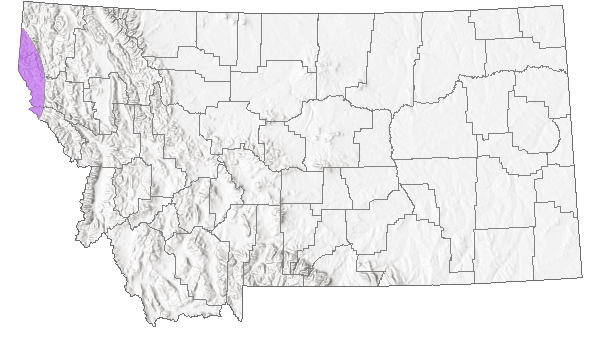
 Native
Native
Range Comments
In MT only in Sanders and Mineral counties; coastal AK and YK south to CA, east to ID and MT (Furlow 1997 in Fl. N. Amer. Vol. 3).
Observations in Montana Natural Heritage Program Database
Number of Observations: 14
(Click on the following maps and charts to see full sized version)
Map Help and Descriptions
Relative Density
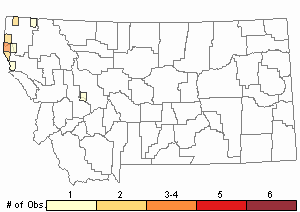
Recency
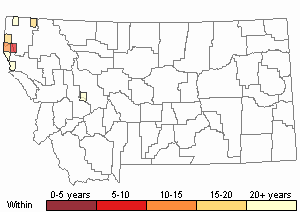
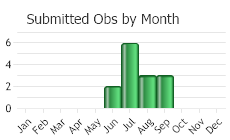
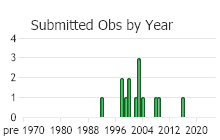
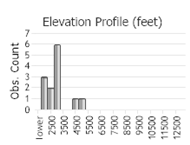 (Observations spanning multiple months or years are excluded from time charts)
(Observations spanning multiple months or years are excluded from time charts)
Habitat
National Vegetation Classification System Groups Associated with this Species
Forest and Woodland
Montane - Subalpine Forest and Woodland
Wetland and Riparian
Riparian and Wetland Forest
Riparian Shrubland
Stewardship Responsibility
Threats or Limiting Factors
STATE THREAT SCORE REASON
Threat impact not assigned because threats are not known (MTNHP Threat Assessment 2021).
References
- Literature Cited AboveLegend:
 View Online Publication
View Online Publication Lesica, P., M.T. Lavin, and P.F. Stickney. 2012. Manual of Montana Vascular Plants. Fort Worth, TX: BRIT Press. viii + 771 p.
Lesica, P., M.T. Lavin, and P.F. Stickney. 2012. Manual of Montana Vascular Plants. Fort Worth, TX: BRIT Press. viii + 771 p. MTNHP Threat Assessment. 2021. State Threat Score Assignment and Assessment of Reported Threats from 2006 to 2021 for State-listed Vascular Plants. Botany Program, Montana Natural Heritage Program, Helena, Montana.
MTNHP Threat Assessment. 2021. State Threat Score Assignment and Assessment of Reported Threats from 2006 to 2021 for State-listed Vascular Plants. Botany Program, Montana Natural Heritage Program, Helena, Montana.
- Additional ReferencesLegend:
 View Online Publication
View Online Publication
Do you know of a citation we're missing? Lesica, P., M.T. Lavin, and P.F. Stickney. 2022. Manual of Montana Vascular Plants, Second Edition. Fort Worth, TX: BRIT Press. viii + 779 p.
Lesica, P., M.T. Lavin, and P.F. Stickney. 2022. Manual of Montana Vascular Plants, Second Edition. Fort Worth, TX: BRIT Press. viii + 779 p. Little, E.L., Jr. 1979. Checklist of United States trees (native and naturalized). Agriculture Handbook No. 541. U.S. Forest Service, Washington, D.C. 375 pp.
Little, E.L., Jr. 1979. Checklist of United States trees (native and naturalized). Agriculture Handbook No. 541. U.S. Forest Service, Washington, D.C. 375 pp.
- Web Search Engines for Articles on "Red Alder"





